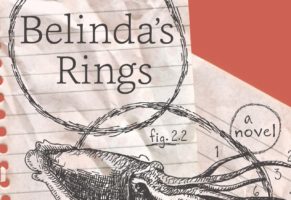On my flight to Ottawa for The Writer’s Union of Canada Conference, I took three personal travelling essentials: a notebook, my netbook and a novel to read while airborne. When you are trapped in an enclosed space with strangers for hours and suspended above the clouds, not only do you need to be entertained but your imagination must be so fully engaged that the author owns you while you are turning their pages.
After running my fingers over a sizable stack of books on my unread shelf, the novel I finally selected to slip into my bag was ‘Belinda’s Rings’ by Corinna chong (NeWest Press 2013) an emerging young literary voice in Canada who has been causing a stir among reviewers and readers alike. Whenever I hear of a book that is gaining in popularity among mainstream media, I adjust the chip on my shoulder and prepare to hate it. Such was the case with Belinda’s Rings, but as it happens, Corinna Chong knocked the chip off my cranky shoulder by the second page.
My written-in-granite criteria for reading beyond the first paragraph of any novel hasn’t changed in many years: If the first line doesn’t reach out and slap, caress, scream, wrench, shock or make me so damn curious I feel like a tormented cat at the mercy of a very clever mouse, I simply stop reading and close the book for good. This particular method has never failed me as an accurate determiner of talent and a good story with solid characters. The first line in Belinda’s Rings not only made me a curious cat but it also did a bit of wrenching: “Squid’s got three mothers who can’t spank him.” From that moment on I wanted to know who or what Squid was, why he had three mothers and why on earth would they want to spank him?
For the duration of my flight, author Corinna Chong set fifteen year old Grace, (the protagonist) loose and as I sat in seat 14 c, this teen girl took me home with her, introduced me to her family and most importantly allowed me to share the contents of her life. The story itself is told from a double narrative point of view, while still maintaining the strength of a single protagonist. In a way this can be likened to a lead actor and supporting actor vying for screen time. This can be an extremely complicated strategy for even a seasoned writer to attempt, the risk being that the reader could become confused regarding point of view as well as with the connection of events and experiences between both characters. Ms. Chong’s finesse in this area impressed me. There was never any doubt as to who was in charge of leading us through each and every page, her character loyalty and focus are that good in this novel. The fact that she chose a mother and daughter to volley the story back and forth until the final page gave the interpersonal depth needed to add purpose to the plot.
Both Grace (the daughter and primary narrative character) and Belinda (the mother and secondary narrative character) tell the story of a family in crisis, isolated but tethered together by love and the grim reality that it often hurts, leaving us bereft of solid ground on which to stand. Grace is the philosopher of her family, a cynic who internalizes the emotional life of those closest to her, in particular her mother, her younger half brother Sebastian (Squid) and her older sister Jess. It is a tale well known in the age of blended families, the emotional and behavioral issues rearing their ugly heads at dinner tables, in hotel rooms, on city buses, at school and in a field of Crop Circles, hence the title of the novel.
Belinda, British by birth, leaves her three children and second husband Wiley behind in Canada to pursue her obsession: crop circles. It initially appears that she has completely lost her mind by bobbing around in the stormy sea of a mid life crisis, but as the story progresses we realize that there is indeed a pattern to Belinda’s movement from one continent to another. Although her children and mentally unstable husband Wiley carry on, it is the absence of her organized, controlling and maternal presence that forces them to reveal who they are in a very purifying emptiness. Belinda’s Rings makes one very important point in an era that has altered forever the family dynamic: roles within the unit are no longer permanently assigned or cemented but rather they are changing, merging and flowing between each as individual needs dictate in a world that is always in a state of flux.
Although I feel that as a debut novel, Belinda’s Rings is superb, there were a few areas that I found distracting as I travelled from one chapter to another. The quality of the thought life of each character in a story is critical if the reader is to relate to and bond with them. If the pacing is off or there are minor inconsistencies, even the odd grammatical faux pas, they are forgotten if the characters are real to the reader. In particular, I found fifteen year old Grace’s emotional life to be far more sophisticated than is possible for any teen, her thought life at times had an irritating satirical tone that bordered on one liners that you might hear on a television sitcom. It was difficult to see her beyond one dimension for much of the novel and it was a disappointment as there was so much promise within the interior life of this character. There was also a meandering to Grace’s thinking, disconnected memories and anecdotes that took on a life of their own, leading the reader up blind alleys of thought. More than once I was left with the impression that the author was using these mental excursions to distract from the lack of substance within Grace’s personality. Only once in the story did I find Grace to be real, with an event three quarters of the way through the novel involving violence and her younger brother Squid. Although this scene finally gave Grace some breath and a heartbeat, the entire scenario was clearly out of context with the rest of the book and a bit disturbing. It felt like a dramatic bandaid used to cover the hollow wound in Grace’s identity.
Belinda’s character on the other hand was quite frequently riveting, her self awareness and clarity of those in her life making her breathe in every passage, baring her thoughts and words that at times were quite emotionally brutal. I wish the author had spent more time exploring Grace’s emotional depth with the same passion, rather than merely scraping the surface of what could have been a formidable character. I was also disappointed that the older sister Jess and stepfather Wiley seemed an afterthought rather than crucial components to the blossoming of the story. Sebastian (Squid) was the exception here, his appearance and participation in moving the plot along was perfect. Ms. Chong’s sensitivity as a writer toward this one character and her well measured approach removed the brittleness of the subject matter making Squid the perfect foil for the anguish surrounding him.
As a debut novel, Belinda’s Rings is far above average. Original and quirky. Corinna Chong has created something special with this book, in much the same spirit as the crop circles that mesmerized Belinda. This story is a reminder that our patterns may indeed be destructive and painful but they are also intricate and perfect in the bittersweet way they cut through our souls as they impart their wisdom.
Val B. Russell is the creator and managing editor of Tuck Magazine as well as a Pushcart nominated poet and novelist.




I await with eager anticipation the arrival of your own novel Val.